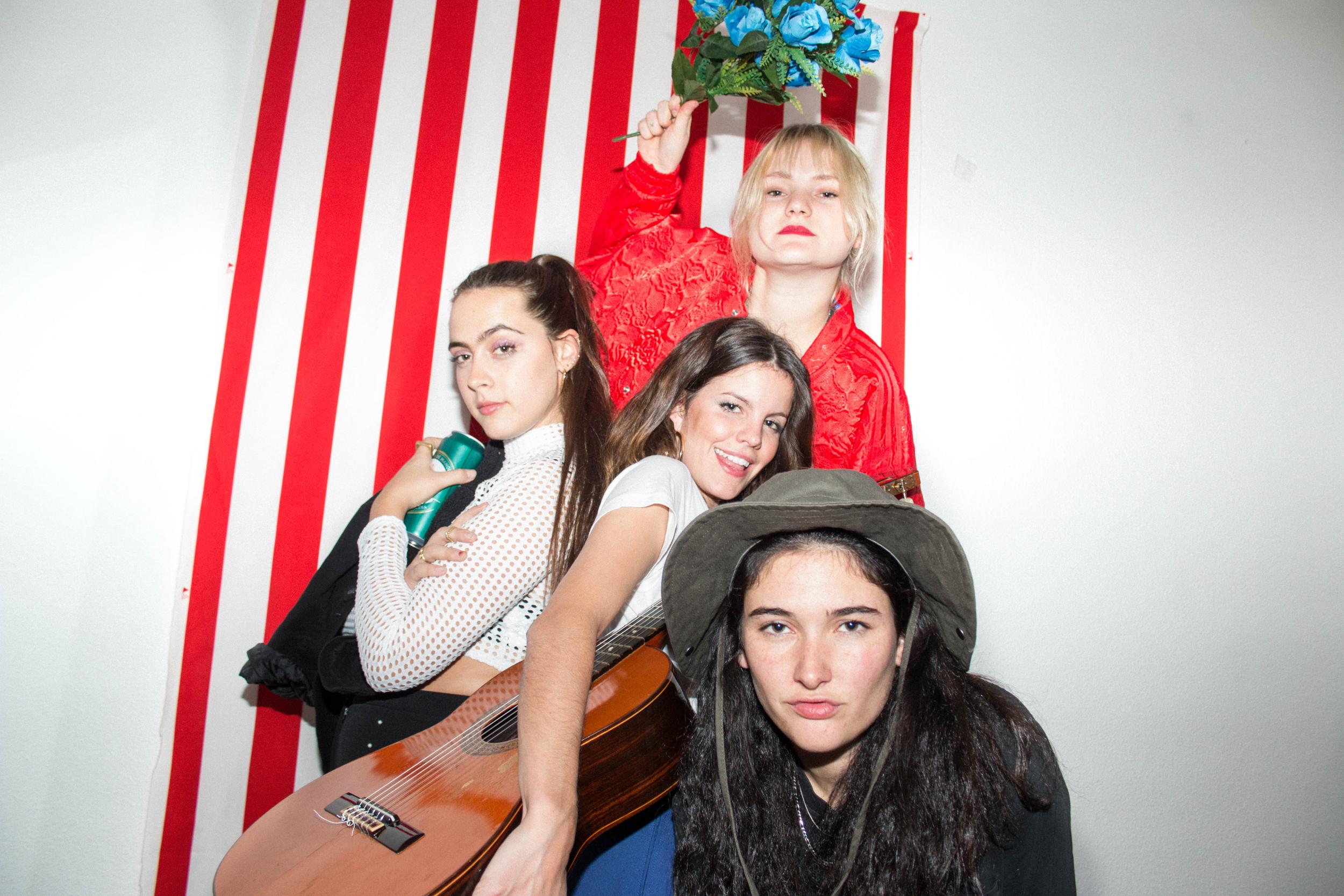Hinds interview: We said 'let's be more honest' on this album
Spanish rock band talk new album ‘I Don't Run’, learning to say ‘no’, and the frosty reception they received in their home town

Spanish band Hinds always seem to be in a hurry. Their debut album, Leave Me Alone, was done in a rush (they think), and while they took their time on the follow-up – I Don’t Run – which has just been released, it still feels as though they made it at breakneck speed compared to your average band.
Working with Gordon Raphael, who produced The Strokes’ first two records, the quartet – Ana Perrote (vocals, guitar), Carlotte Cosials (vocals, guitar), Ade Martin (bass) and Amber Grimbergen (drums) – put together an album with a summery, DIY feel; packed with upbeat melodies and downcast lyrics.
“He’s really easy to work with,” Cosials says of Raphael. The band are sprawled around a coffee table at The Independent headquarters – some on chairs, some sat cross-legged on the floor – a little weary from their flight from Spain but excited to talk about I Don’t Run. “He didn’t want to influence anything – his way of recording bands is to record exactly what the band is like, so when we asked what he thought of something he’d be like, ‘what do you think of it?’ It was a really smooth process and we’re very happy with the songs.”
While there’s still an innocence to their joyful, raucous harmonies and the youthful sound on their guitars, their lyrics have matured by what sounds about a decade. Where they seemed determined to act like one of the boys on their first record, here they embrace the most powerful elements of female sexuality, writing searingly honest and nuanced takes on broken relationships.
“I think we’ve been braver that way,” Perrote nods. “With the process it was more or less the same, for writing, but we said let’s be more honest. Don’t feel ashamed… when you start writing songs there’s always a bit of fear that the person you’re talking about will know. You feel like you cannot use your life for your art because it’s too intrusive.
“And suddenly for this album – for two years we were touring and experiencing new things, falling apart and standing up again – doing the album was like putting all of that into the record. We decided to make the most we can of ourselves, because we felt it was going to be special.”
“It’s a little bit sketchy, but then we realised nobody actually reads the lyrics so I don’t think we’re going to have any phonecalls from ex-boyfriends, like, ‘oi dude!’” Cosials laughs. She says it’s difficult to choose a favourite song because many are about sad experiences, “and choosing what is your favourite sad experience is kind of weird”, but she loves “Linda”.
“I like ‘Linda’ because I feel like that’s something everyone has lived or will live at some point in their life,” Perrote agrees, “you used to love someone and it’s that moment like, ‘what the f**k happened – why aren’t we in love anymore?’”
Last time they were preparing for a tour they found themselves saying “yes” to just about anything bookers could throw at them; now they’re trying to be a little more selective, although they’re still one of the most in-demand bands on the summer festival circuit.
“Ooft!” Cosials says decidedly of their live show. “We’ve been rehearsing since February, it’s a whole new experience, so cool.”
“It’s way more dynamic I think, even the ones with the saddest energy,” Perrote adds. “Really strong.”
It feels like Hinds have been around for far longer than two albums, they’re so together, and so in sync as a group. They’re more likely to put the pressure of expectation on themselves, as well, than to be worried by any outside influence.
“But in a good way: you imagine your life in the future, and you just wanna do it,” Cosials says. “We wouldn’t push ourselves to go on for longer just because of people’s expectations.
“You never know when it’s going to end. It could last for ever, it could last a year. So when we get these festival offers, we think, well it could be the last time we get it! This might be the last time we get to go to Australia together. We’ve had to learn to say ‘no’.”
That “togetherness” you pick up on when you hang out with Hinds is a key part of why they seem to find being in the band such a breeze. There’s none of the tension you sometimes sense when interviewing more than one artist together – there’s no clash of egos.
“We have to be clear and go on stage with nothing to hide,” Cosials explains. “When you’re holding something back that you don’t want to say, but you’re thinking about that while playing, it’s no good. Or writing a song, or rehearsing. Holding bad feelings about your bandmates… you have to live together for so many hours a day, you have to be open or it will break you.”
“The more bands we meet – it’s horrible I’m saying this – but you meet so many people, you see some of them are really delicate,” Grimbergen says, “these artists that can’t take so many new people a day, the pressure. I think we’re really strong together.”
“I think it’s because none of us has a big ego,” Cosials suggests, making the others laugh. “Maybe as a band altogether, but separately we don’t clash in the vans or anything.”
It’s a surprise to hear about the lack of support they’ve had in their home town – bands in the UK with Hinds’ level of success would be local heroes by now.
“Being Spanish, we had the worst beginning as a band in our home town,” Perrote says. “Now it’s more divided, half of the people like us, half hate us... but until Leave Me Alone came out, it was shit.”
“They [the Spanish media and other local artists] felt we didn’t deserve it because we were so new, we hadn’t studied at the conservatory for nine years,” Cosials says with a bit of a sneer. “In Spain, they don’t like something that is new. Here, you love someone young and fresh blood, in Spain we hate that. They don’t trust it.”
“All the big bands in Spain are over 35,” Martin shrugs. “They’re all men. It’s such an old style, as well.”
“It’s like... this resentment,” Cosials says. “Like, ‘I’ve been waiting for this forever, and you just started and you’re getting it, so why aren’t I?’”
“All the clubs in Madrid we go to, nothing has changed in 10 years, it’s the same music!” Perrote exclaims. “So it isn’t just us they had something against, it’s all new bands. No one would get the cover of a magazine before they released a record.” She shrugs. “I don’t know, we only had two songs released but here in the UK, it felt like people trusted us, people still came to our shows. That would never happen in Spain.”

Writing songs together for I Don’t Run, they found themselves thinking in English more and more: the lyrics are clearer, and Cosials feels as though they’ll stay connected to these songs for a lot longer than they did on the last record.
“I really love that process, for us, before it’s on paper it’s this mess of feelings and sensations, and then you write it down and suddenly it’s this art you’ve created,” she smiles. “And doing it in different languages, it’s like having different worlds.
“And the lyrics themselves... the usual thing is to blame the other person for how you’re feeling, and I think what’s cool about Hinds, is we blame ourselves a lot – it’s normal,” she laughs. “And it’s more real – not something superficial like ‘I miss you and you left me’. Life is more complicated than that.”
Join our commenting forum
Join thought-provoking conversations, follow other Independent readers and see their replies
Comments
Bookmark popover
Removed from bookmarks